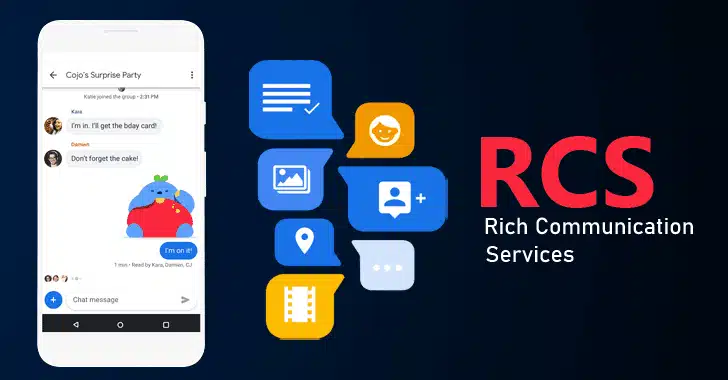Table of Contents
In the rapidly evolving world of communication, staying connected is more important than ever. While SMS has dominated mobile messaging for years, a new technology is set to revolutionize how we communicate—Rich Communication Services (RCS). This next-generation messaging protocol promises to transform mobile messaging by offering richer features, improved interactivity, and enhanced security.
RCS is not just an upgrade to SMS; it’s a complete evolution. As more businesses and consumers embrace this technology, it’s clear that RCS is paving the way for the future of messaging. Let’s explore RCS, how it works, and why it’s considered the next big thing in communication.

What is Rich Communication Services (RCS)?
Rich Communication Services (RCS) is the modern standard for mobile messaging, designed to replace SMS and MMS. It offers more interactive, multimedia-rich experiences for users. Unlike SMS, which is limited to 160 characters and basic text, RCS enables users to send high-resolution images, videos, voice messages, and interactive buttons.
RCS also supports group messaging, read receipts, typing indicators, and advanced file sharing, making it a comprehensive messaging solution for personal and business communication. In short, RCS brings many features of popular messaging apps, like WhatsApp and Facebook Messenger, directly to your default SMS app.
How Does RCS Work?
RCS works over a data network, just like other internet-based messaging platforms. However, instead of relying on third-party apps, RCS integrates directly into the native messaging app on your smartphone. Users don’t need to download a separate app to enjoy its features.
When two devices support RCS, the message automatically uses RCS instead of SMS. If the recipient’s phone doesn’t support RCS, the message defaults to SMS. This seamless integration ensures that messages are delivered, no matter what.
Key Features of RCS
RCS offers many features that take mobile messaging to the next level. Here are some of the key elements that make RCS stand out:
1. Multimedia Messaging: Unlike traditional SMS, which is limited to plain text and low-quality images, RCS allows users to send high-quality photos, videos, GIFs, and audio clips. This feature enhances the user experience by enabling richer, more engaging conversations.
2. Read Receipts and Typing Indicators: One of RCS’s most popular features is its real-time interaction updates. Users can see when someone is typing a response and when their message has been read. These features, like those of chat apps like iMessage, bring a more fluid and interactive feel to conversations.
3. Group Messaging: RCS improves group chats by offering support for larger groups, multimedia sharing within groups, and real-time updates on who’s seen which messages. This feature enhances group collaboration, making it ideal for personal and business use.
4. Interactive Buttons: One of the biggest innovations with RCS is the inclusion of interactive buttons in messages. Businesses can send messages with embedded buttons that allow users to take immediate action, such as making reservations, confirming appointments, or viewing a product catalog.
5. End-to-end Encryption: Security is a top concern in today’s digital age. RCS promises enhanced security through end-to-end encryption, ensuring that messages remain private and secure between sender and recipient.
Why RCS is the Future of Business Messaging
For businesses, RCS offers game-changing opportunities to enhance customer communication. The limitations of SMS are no longer a concern. With RCS, companies can offer a more engaging and interactive experience. Here’s why RCS is set to transform business messaging:
1. Rich Media for Better Engagement: RCS enables businesses to send visually engaging content directly to customers’ phones, such as product images, promotional videos, or event invitations. These media-rich messages capture attention more effectively than plain SMS.
2. Personalized Customer Interactions: Businesses can create a seamless and personalized customer experience with features like interactive buttons and suggested replies. For example, a restaurant could send a reservation confirmation with buttons for “Modify Reservation” or “Cancel Reservation,” giving customers instant control over their interactions.
3. Improved Customer Support: Businesses can use RCS to offer real-time support through two-way messaging, helping customers solve problems faster. Typing indicators and reading receipts reassure customers that their queries are being addressed promptly.
4. Higher Conversion Rates: Interactive messages with call-to-action buttons can increase conversion rates. Customers can complete transactions, schedule appointments, or engage with promotions directly from the messaging app, reducing friction and improving the likelihood of engagement.
5. Integrated Analytics: With RCS, businesses can access more detailed analytics, including open rates, interaction rates, and delivery reports. This data helps companies refine their messaging strategies and improve customer engagement.
How RCS Competes with Popular Messaging Apps
While messaging apps like WhatsApp, Facebook Messenger, and iMessage have long dominated the messaging space, RCS brings many of their best features into the native messaging app without requiring users to install additional apps.
The key advantage of RCS is its integration with carrier networks, allowing it to reach users worldwide without depending on internet-based apps. Because RCS works on the native messaging platform, it is more accessible to users who prefer not to download and manage multiple apps.
Additionally, RCS provides a uniform messaging experience across different devices and networks, making it easier for businesses to engage with a global audience.
Challenges and Limitations of RCS
Despite its many benefits, RCS is still facing a few challenges on its path to widespread adoption:
1. Carrier and Device Support: One of the biggest hurdles for RCS is the fragmented support among mobile carriers and devices. While major airlines and Android devices are adopting RCS, some carriers, especially smaller ones, may not fully support the technology. Apple has also not integrated RCS into iMessage, which means cross-platform messaging still falls back to SMS.
2. Lack of Universal End-to-End Encryption: While RCS supports end-to-end encryption for one-on-one messages, it is not yet available for group chats. This raises concerns for users who prioritize security and privacy in their communications.
3. Slow Global Rollout: Carriers are gradually rolling out RCS worldwide, but the process is slow. Until universal adoption occurs, businesses and users may experience inconsistency in how RCS messages are delivered.
The Future of RCS
Despite these challenges, the future of RCS looks promising. Major players like Google are investing heavily in RCS, aiming to make it the standard for mobile messaging. As more carriers adopt the technology and devices become more compatible, the limitations of SMS and MMS will fade away.
For businesses, RCS presents an opportunity to connect with customers more meaningfully. By leveraging rich media, interactive buttons, and real-time communication, companies can create seamless customer journeys that drive engagement and loyalty. RCS will likely become the go-to personal and professional communication platform as technology matures.

Final Reflections
Rich Communication Services is not just the next step in mobile messaging; it’s the future. RCS is poised to transform how we communicate by combining the best features of SMS and advanced messaging apps. From multimedia sharing to real-time interaction and enhanced business messaging, RCS offers various features that will redefine mobile communication.
As more carriers and devices support RCS, consumers, and businesses will benefit from a more interactive, engaging, and secure messaging experience. If you’re a business owner or a tech-savvy consumer, now is the time to explore how RCS can enhance your communication strategy.
Get ready—the future of messaging is here, and it is called RCS.






